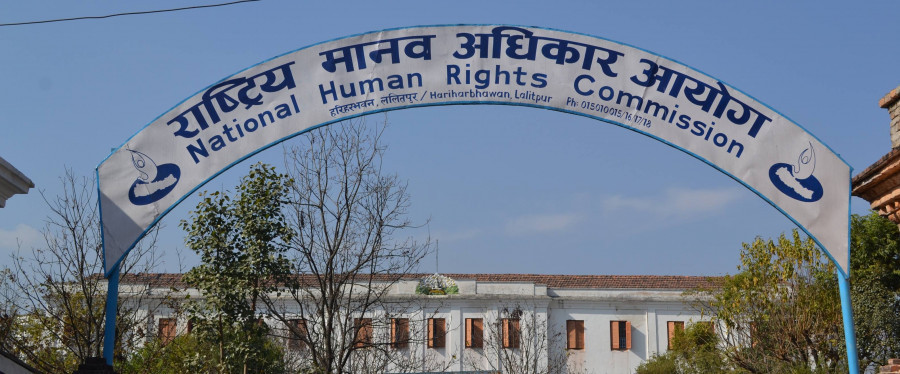National
Campaigners join global call for lawful postings at Human Rights Commission
The National Human Rights Commission has the chance of becoming a mere shadow of the government, they say.
Binod Ghimire
Pressure is mounting on the Nepal government to rectify the appointments made in the constitutional bodies mainly the National Human Rights Commission.
After the international community, human rights defenders from the country have said the reputation of the constitutional human rights watchdog has suffered under the leadership of the chairperson and the members appointed without following due legal process. Nine human rights defenders including Kapil Shrestha, Mohna Ansari and Govinda Sharma Poudyal — all of whom are former members of the commission, have said the appointments made by sidelining the constitutional and international obligations is a grave setback to the constitutional commissions especially the National Human Rights Commission.
“The appointments process has not only failed to follow the essential requirements of the Paris Principles but also failed to adhere to domestic law as enshrined in the Constitution of Nepal,” the group of human rights defenders which also includes Charan Prasai, Dinesh Tripathi, Raju Chapagain, Rajan Kuikel, Om Prakash Aryal and Om Prakash Sen Thakuri, said in a statement on Sunday. “We, therefore, strongly urge the Nepal Government to urgently rectify these flawed appointments and initiate a new process for the appointments based on well-accepted standards and processes.”
The human rights defenders say the National Human Rights Commission headed by individuals appointed without following due process has the chance of becoming a mere shadow of the government. They say the constitutional commissions need to be stronger to hold the government to account and their roles are even more important in the times of crisis. “The present government is reluctant to protect the people’s right to life, health, education and employment in the time of a pandemic,” Shrestha told the Post. “When the constitutional bodies are not strong, they cannot advocate for the rights of the people. The commissions led by the people appointed by the grace of the executive head can never hold the government to account.”
The National Human Rights Commission has already faced criticism for defending the government by issuing a rebuttal to the concerns of three international human rights organisations. On March 1, the New York-based Human Rights Watch, the Geneva-based International Commission of Jurists, and the London-based Amnesty International had urged the government to immediately withdraw the appointments made to the National Human Rights Commission arguing such appointments undermine the independence of constitutional human rights bodies as they were made without proper consultations or parliamentary approval.
A week later on March 7, the commission issued a rebuttal arguing that the three human rights organisations were interfering in the internal matters of a sovereign nation.
The human rights defenders say the more the appointments correction is delayed, the more it will harm the reputations of the constitutional commissions.
On December 3 last year, the chairperson and four members of the National Human Rights Commission along with 27 other appointees to different constitutional bodies had taken the oath of office and secrecy.
The Constitutional Council, headed by Prime Minister KP Sharma Oli, on December 15, had made a total of 38 recommendations for nominations to various constitutional bodies after amending the Constitutional Council (Functions, Duties, and Procedures) Act through an ordinance, which allowed the council to recommend names in the presence of its majority members. The meeting of the five-member council that made the recommendations was boycotted by Speaker of the House of Representatives Agni Sapkota and Nepali Congress President Sher Bahadur Deuba, the leader of the opposition in the House.
The constitutional provision that parliamentary hearings must be conducted for the appointments was not followed as Oli went on to dissolve the House on December 20. In the absence of hearings, the candidates could be appointed 45 days after their names were recommended to the President. “We need to protect the integrity and independence of such institutions,” Prasai told the Post. He said the human rights commission hasn’t taken any position when the Ministry of Health last week said it was not in a position to provide hospital care to new patients in the lack of adequate beds.
“The commission clearly is under the influence of the government,” Prasai said. “The government must listen to the concerns of the national and international organizations and rectify the appointments.” After the three international human rights organisations, the Global Alliance of National Human Rights Institutions in the last week of March sought clarification from the commission if its autonomy and independence, as mandated by the Paris Principles, was ensured in the appointments process.
The United Nations Office of the High Commissioner for Human Rights serves as the secretariat of the alliance which has 127 members. Similarly, on April 27 the United Nations special rapporteurs on the different thematic groups urged the Nepal government to rectify the appointments made in the National Human Rights Commission.
The nine special rapporteurs said the recent appointment of the chairperson and the members in the commission is inconsistent with international standards. They said that they were deeply concerned that the appointment process is not in line with international standards and that it undermines the independence, integrity and legitimacy of the National Human Rights Commission and restricts the ability of the people of Nepal to access appropriate remedies for alleged human rights violations.
The human rights defenders say the commission could lose its grading if the faulty appointment process is not corrected. Currently, Nepal is among 84 countries whose human rights commissions are listed under the ‘A’ grade. The ‘A’ grade status of the human rights commission was one of the points Nepal presented while seeking a vote to get elected to the United Nations Human Rights Council.
“It is sure that the commission will be downgraded if the government continues to ignore the calls to rectify the appointment,” said Shrestha.




 13.12°C Kathmandu
13.12°C Kathmandu














